Global Lens Reflections on life, the universe, and everything
Cuba: Time to go
Have you wanted to visit Cuba for a while? President Barack Obama is expected to soon announce a loosening of restrictions on the rights of U.S. citizens to travel to Cuba.
D’uh. It’s the least we can do. After five decades of blockading Cuba, the U.S. has nothing to show for it but hard feelings throughout the hemisphere. Just as U.S. policy favoring Israel in the Middle East is an obstacle to improving relations with the Arab and Muslim worlds, so is our stupid and anachronistic Cuba policy an obstacle to deeper cooperation with Latin America. As we all know, U.S. policy toward Cuba has little to do with what actually happens in Cuba and everything to do with the dark side of U.S. politics.
A U.S. citizen is free to travel to Khartoum, Tehran or Pyongyang, but we’re not supposed to cross the narrow Florida Straits to visit what some refer to as our closest of enemies. People do anyway; they just have to go to Canada or some other third country before catching a flight to Havana or Santiago. Although as a journalist I’m exempted from the travel restrictions imposed under the Trading With the Enemy Act, when I’ve traveled to Cuba I’ve done so on flights from Panama, Nicaragua, Mexico, and elsewhere. Those flights are full, as are numerous daily tourist flights from Spain and other European countries. According to the Caribbean Tourism Organization, Cuba welcomed more than 2.4 million visitors last year. About 38 percent were from Canada, 34 percent from Europe and 28 percent from other regions of the world. That’s a lot of mojitos.
The small change in policy being hinted at by the Obama administration (they’re planning to loosen the restrictions on travel, not remove them altogether, as well as increase the number of airports where direct flights can originate) seems especially timid given the Cuban government’s recent decision to free 52 prisoners rounded up in 2003, the result of serious negotiations with Spain and the Cuban Catholic Church. It’s precisely the kind of positive action by Cuba which should be applauded by those demanding reform on the island, but instead it was met with the same myopic stare which has characterized Washington’s approach to Havana for 50 years. Obama seems unwilling to spend much political capital on Latin America, so Bill Richardson snuck off to Havana to sell chilies and lobby quietly for the release of a seemingly hapless USAID contractor who was arrested handing out hi-tech communications equipment to dissident groups after entering the country on a tourist visa. (Some suggest a swap of the USAID contractor for the Cuban Five would be a positive step.) The proposed changes in travel restrictions were quietly run up the flagpole a couple of weeks ago, and so far nothing more has been said on the matter. Perhaps the changes will be announced quietly over Labor Day weekend. As anemic as the changes will be, perhaps they’ll encourage the Congress to get serious and pass HR 4645, the Travel Restriction Reform and Export Enhancement Act—without amendment. The bill was approved by the House Agriculture Committee on June 30 in a 25-20 bipartisan vote. It would restore some of our freedom to travel to Cuba while making it easier for U.S. farmers to sell their products to the island. The Latin American Working Group has posted an online petition to communicate your support for HR 4645 to your representatives in Congress.
I’ve enjoyed traveling in Cuba. I’ve found Cubans to be expressive, uninhibited and fun, and while acknowledging the challenges they face nonetheless proud of all they’ve accomplished.
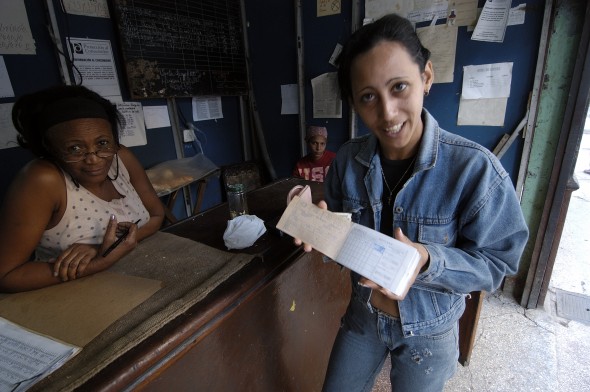
Havana woman complains about shortages of basic articles rationed by government to assure widespread distribution.
As someone who often covers major disasters, I am particularly intrigued by the relative grace with which Cuba absorbs the brunt of Caribbean weather. The same storm which will bedevil a neighbor will produce dramatically less human suffering in Cuba, where unparalleled levels of education and organization lower social vulnerability, thus lessening the disaster produced by the inevitable natural hazard. Here’s the beginning of an article I wrote from Cuba for the Christian Century in late 1999.
The taxi’s motor died three times as the driver wound his way around the fallen trees and through the flooded streets of Havana. He was trying to get me back to my hotel before the worst of Hurricane Irene overcame Cuba’s capital in mid-October. Each time the car stalled, I climbed out to push the decrepit Lada, a Soviet version of the most frugal Fiat, out of the deep water. And each time help appeared, anonymous volunteers who waded into the choppy waters with heads bowed against the wind to help push the Lada to dry land. Once the mission was accomplished, they disappeared with just a smile into the wet wind and flying branches.
Having lived through Hurricane Mitch in Central America, I was fascinated by the Cuban response to Irene. Although property damage to crops and property–especially the rickety old colonial buildings in Old Havana–was significant, loss of life was minimal. Only four people died, a tribute to the organizational capacity of the Cuban people, who respond to hurricanes with the same discipline they have practiced for years in preparation for a military invasion from across the Florida Straits. And they exercise interpersonal solidarity with the same spirit that led them to send soldiers to Africa or doctors to Honduras. In the middle of a crisis, it all pays off.
Despite the tattered but intact image in the U.S. of Cuba as a repressive society, I have always traveled freely wherever I wanted on the island. On my last trip, in 2004, I rented a car for a couple of weeks and drove from almost one end of the country to another. I talked to whomever I wanted, and only had one problem. One night while taking rear curtain flash photos of old cars on a Havana street, I was soon visited by a police patrol car. Turns out the building across the street was some state security facility, and the cops thought they might have caught a bumbling CIA agent red handed. But here comes a great advantage of digital over film. I was able to show them on the back of the camera precisely what I was doing. They were fascinated, and we spent a while talking about cameras. Then they got on the radio and tried to explain it to their superior, who still had illusions of a promotion for catching the spy of the decade. The radio conversation went on for almost an hour, and the two police officers finally let me continue shooting as they continued arguing over the radio.
I’ve had other minor issues. While most of my writing about Cuba has focused on religious issues, on one trip I was working on a story about the sugar industry, which was in trouble, and the government press office had promised me an interview with one particular expert in a state ministry. They kept dragging their feet, and with time running out on my visit I called the guy myself. I told him what had happened, and he complained to the press office the next day, which earned me a nasty phone call from the bureaucrat who’d strung me along.
I also got into problems once with the government’s office of religious affairs, when I wrote a piece in 1999 for Ecumenical News International (ENI), a Geneva-based agency. The problem was that ENI took a piece I wrote from Cuba and added in a bunch of inaccurate material they found on the web about the supposed repression of some Catholic activists. The story had my byline, however. In an effort to head off problems, I went to the Cuban authorities with it to explain what had happened. I don’t mind suffering the consequences for what I write, but I refuse to take the rap for the irresponsible acts of others. The people in the religious affairs office made frowny faces but said they understood, yet the next time I requested a journalist’s visa from Cuba I suffered the consequences. The government press office turned me down, and only after the Cuban Council of Churches asked the government’s office of religious affairs to intervene was my visa granted. (And I later quit writing for ENI after a couple similar misdeeds on their part.)
A definite highlight of all my Cuba trips was a dinner I had one evening with Fidel. Well, along with some other folks. I was in Cuba to help with press relations for a visit to the island by Konrad Raiser, then the head of the World Council of Churches. When Raiser got invited to dine with the comandante, I got to tag along. There were about 16 or so people at the dinner, if I remember right (there was a lot of booze). It included Cuban church leaders, some top government officials and the other members of Raiser’s entourage. Of the whole bunch, I was the only U.S. citizen. Fascinating discussion. When the evening came to a close about 4 in the morning, Fidel escorted us to the door where he greeted each of us in turn as we walked out into the dark and quiet Plaza de la Revolución. When my turn came to greet him, I had a two-sentence speech all ready to go. I was going to say, “Comandante, I am a gringo but I live in Honduras. And I want to thank you for the solidarity your government and people have displayed in Honduras in the year since Hurricane Mitch.” I shook hands with Fidel and launched my speech, but as soon as I said I was a gringo, he interrupted. Oye, chico, yo no he dicho nada mal de ustedes esta noche! “Listen, man, I haven’t said anything bad about you guys all evening!” I laughed. Es cierto. Pero tranquilo, comandante, y dejame decir lo que le iba a decir. “That’s true, Comandante, but calm down and let me say what I was going to say.” And then I gave my two-sentence speech. He laughed, thanked me, and gave me a bear hug.
Cubans from all walks of life, like people everywhere, like to complain about the shortcomings of their political leaders, and although there is a tremendous amount of respect for Fidel, over the years people I’ve talked with haven’t been afraid to let me know where they disagreed with him. If they were concerned that someone inappropriate might be listening, they would sometimes stroke their chin–simulating a beard–as they expressed their discontent. Such reticence has become less common over the years, and I always found little fear of expressing contrary opinions among people in churches and academia. Fidel’s brother Raul doesn’t enjoy the same sort of historic respect as does Fidel, however, and that complicates his attempt to govern in the shadow of his (recently reappeared) brother.
Writing about religious issues in Cuba has been an exercise in introducing nuance into an otherwise two-dimensional narrative. It’s true that shortly after the triumph of the revolution, there was a backlash against many churches and church leaders because of their historic support for the Bautista regime. Yet time moves on, and Fidel and others long ago expressed regret over their early actions, and in 1992 the constitution was changed to declare the government to be officially secular rather than officially atheist. Even before that, Fidel’s famous series of interviews with Frei Betto, Fidel and Religion, was published and widely read. I remember a passage where Fidel is talking about his atheism, describing the God he doesn’t believe in–a God who supported repression and discrimination. Frei Betto responds by telling Fidel that he also does not believe in that God. Amen.
I’m one of those people who believe that we have a lot to learn from the experience of Cuban Christians. Yet it frightens me that some of those drooling over the possibility of relaxed travel rules are conservative U.S. evangelicals who want to flock to Cuba to convert the heathen. Evangelism is a two-way street, but that’s a lesson lost on many conservatives. On one trip, I witnessed a mass baptism at a Methodist church in Havana. Several prominent U.S. evangelical Methodists were there, and they were waist deep in the swimming pools baptizing dozens of new Cuban Christians. No problem, until I closed in on the action to fill the frame with the baptism. The U.S. guy doing the baptizing was doing so in English! The clown couldn’t learn a few words of Spanish? It made me angry. The next time I saw the guy, he was at General Conference lobbying against opening church doors to all sexual orientations. Colonialism has its defenders.
A note about scheduling. I was originally supposed to be in Gaza this week, but the trip got cancelled at the last minute because of delays in getting the right permits from the Israeli military. I wasn’t happy about that, but then tried to put together a quick trip to Pakistan, where the disaster provoked by the flooding is mind-bogglingly huge. That trip didn’t work out either, as by the time I got the visa from the Pakistani foreign ministry and actually got into the country, I only would have had about four days on the ground before I had to leave to be back in the states to begin itineration in California on September 12. So I reluctantly pulled the plug on that trip as well. (My travel agent is very patient with me.) If you’d like to help people in Pakistan in the wake of the quake, I’d recommend Church World Service.
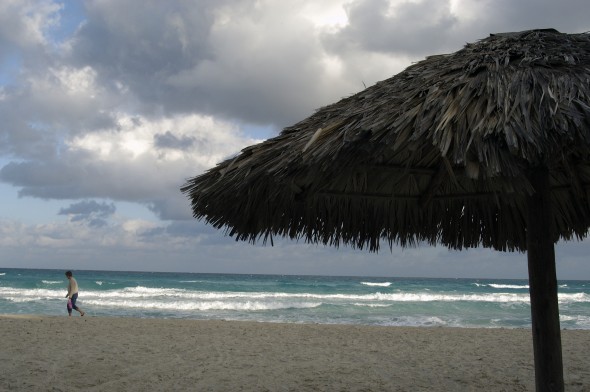
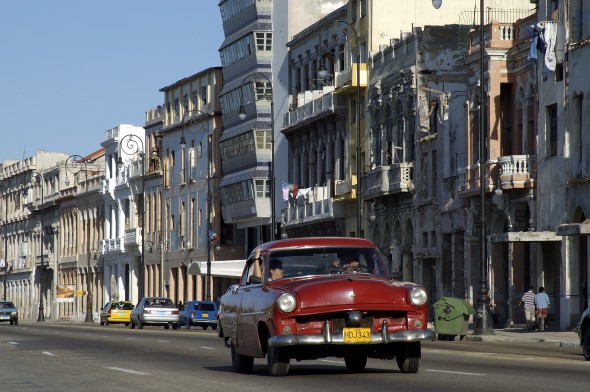
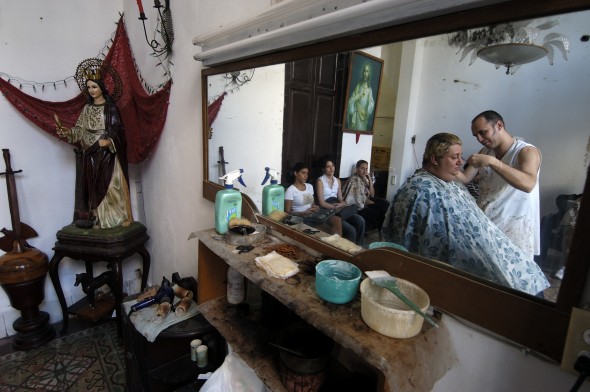

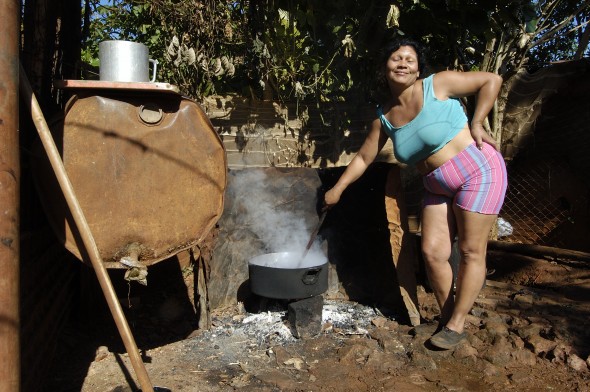
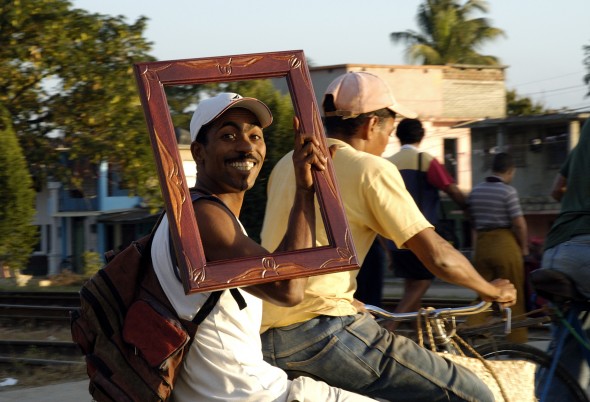
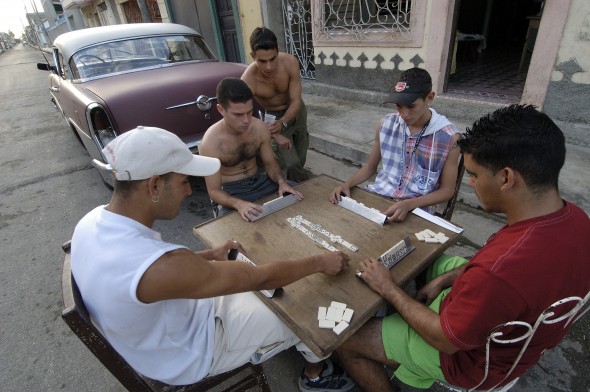
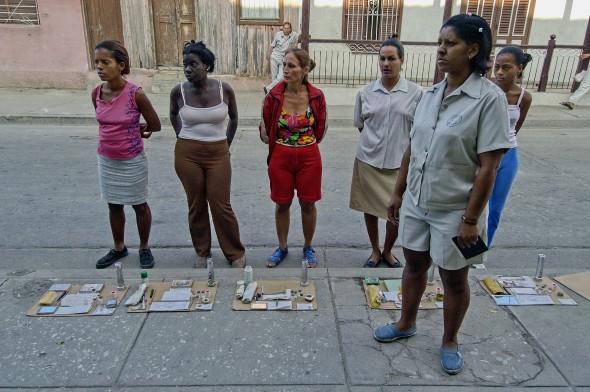
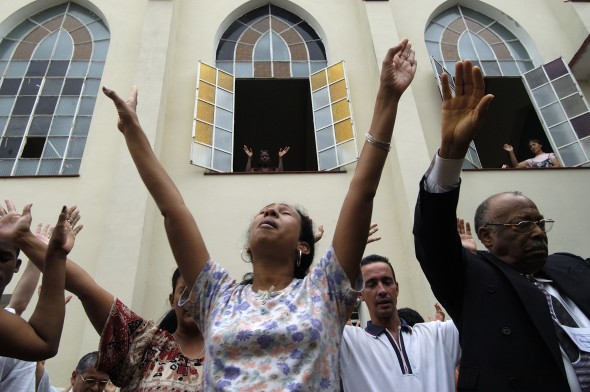
2 Responses to Cuba: Time to go